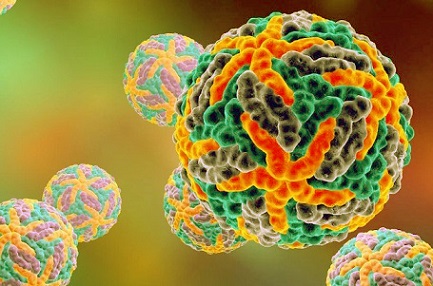Taiwanese murine study shows that Dengue virus envelope protein causes dangerous hemorrhage and endothelial cell death
Nikhil Prasad Fact checked by:Thailand Medical News Team Oct 10, 2024 1 year, 2 months, 1 week, 4 days, 21 hours, 42 minutes ago
Dengue News: Researchers from Tzu-Chi University and Hualien Tzu Chi Hospital in Taiwan have made a breakthrough in understanding how the dengue virus (DENV) contributes to the dangerous condition of hemorrhaging in patients. Their study, which focused on the dengue virus envelope protein (EIII), provides insights into why certain individuals infected with DENV develop severe symptoms such as bleeding and endothelial cell death. This
Dengue News report will explore the findings of the study, which also suggests potential treatments for mitigating the harmful effects of the virus.
 Taiwanese murine study shows that Dengue virus envelope protein causes
Taiwanese murine study shows that Dengue virus envelope protein causes
dangerous hemorrhage and endothelial cell death
Dengue Virus and Its Impact
Dengue fever is a growing concern in tropical and subtropical regions worldwide. The infection is transmitted through the bites of infected mosquitoes and can lead to dengue hemorrhagic fever (DHF) in severe cases. DHF is particularly dangerous because it causes damage to the blood vessels, resulting in internal bleeding, low platelet counts, and even death. There are currently no specific antiviral treatments available for DENV, which makes the findings of this study even more significant.
The study delves into the critical role that the dengue virus envelope protein domain III (EIII) plays in causing endothelial cell death and how researchers aim to use this information to develop potential therapies.
The Role of EIII in Endothelial Cell Damage
The study conducted by Dr Te-Sheng Lien, Dr Der-Shan Sun, Dr Wen-Sheng Wu, and Dr Hsin-Hou Chang examines how the dengue virus envelope protein, particularly its domain III (EIII), can induce cell death in endothelial cells. The researchers used both in vitro (cell culture) and in vivo (mouse model) experiments to investigate the effects of EIII.
In their laboratory experiments, they observed that when human endothelial cells were exposed to recombinant EIII (rEIII) and the full dengue virus, the cells underwent apoptosis - a form of programmed cell death. This was confirmed by measuring the activity of caspase-3, an enzyme involved in apoptosis. The presence of caspase-3 activity indicated that EIII directly triggers the destruction of these cells.
Hemorrhagic Pathogenesis in Mice
To further explore these findings, the team conducted experiments on mice. The results showed that sequential injections of rEIII and anti-platelet immunoglobulins led to significant endothelial cell death, mimicking the hemorrhagic symptoms of DHF. Notably, the study revealed that this cell death was driven by caspase-3 activity, further confirming the role of EIII in endothelial damage.
The researchers were also able to observe physical symptoms of hemorrhage in the mice, such as thrombocytopenia (low platelet count), inflammation, and hypercoagulation, which are characteristic of DHF. This mouse model provided compelling evidence that EIII plays a key ro
le in inducing hemorrhage during DENV infection.
Potential Therapeutic Interventions
One of the most promising aspects of the study is the discovery of potential treatments that could mitigate the effects of EIII-induced hemorrhage. The researchers tested several inhibitors, including chondroitin sulfate B (CSB), N-acetyl cysteine (NAC), and a caspase-3 inhibitor known as z-DEVD-FMK. Each of these inhibitors was found to significantly reduce endothelial cell death in the laboratory setting.
CSB, for example, works by preventing the EIII protein from binding to endothelial cells, while NAC acts as an antioxidant that reduces oxidative stress during DENV infection. The caspase-3 inhibitor z-DEVD-FMK blocks the activity of caspase-3, preventing the apoptosis of endothelial cells.
When these inhibitors were tested in mice, they were found to alleviate many of the symptoms of DHF, including thrombocytopenia, inflammation, and hemorrhage. The most effective combination of treatments involved the use of CSB and NAC, which together provided the most comprehensive protection against the damaging effects of EIII.
Conclusions and Implications for Future Research
The study’s findings offer a new understanding of how the dengue virus causes severe hemorrhagic symptoms in patients. By identifying the role of EIII in endothelial cell death, the researchers have provided valuable insights into potential therapeutic targets for preventing or treating DHF.
The researchers concluded that targeting the EIII protein and its associated pathways, such as caspase-3-mediated apoptosis and oxidative stress, could lead to the development of new treatments for dengue fever. The use of inhibitors like CSB, NAC, and z-DEVD-FMK shows promise in reducing the damage caused by the virus, offering hope for future therapeutic interventions.
Moreover, this study underscores the importance of continued research into DENV and its effects on the human body. While the results are promising, further research is needed to confirm these findings in human patients and to determine the best ways to apply these treatments in clinical settings.
In conclusion, the study highlights the role of the dengue virus envelope protein in inducing dangerous hemorrhagic symptoms. The research not only sheds light on the underlying mechanisms of DHF but also opens the door to potential treatments that could save lives.
The study findings were published in the peer-reviewed International Journal of Molecular Sciences.
https://www.mdpi.com/1422-0067/25/19/10858
For the latest
Dengue News, keep on logging to Thailand Medical News.
Read Also:
https://www.thailandmedical.news/news/study-warns-that-coinfections-with-dengue-trigger-the-emergence-of-new-sars-cov-2-variants
https://www.thailandmedical.news/news/taiwanese-study-finds-that-hernandonine-from-hernandia-nymphaeifolia-can-be-used-to-combat-the-dengue-virus
